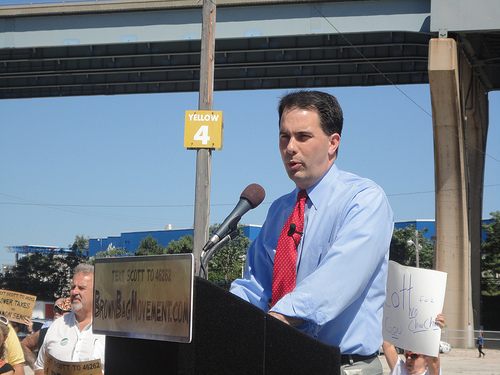Will Walker Go Back to the Future?
He offered transportation-funding plan in 2011 that may get reconsideration.
Once upon a time, Gov. Scott Walker offered a long-term funding plan for highways, bridges and other statewide transportation projects. And it didn’t raise the gas tax or annual vehicle registration fee – tax increases the Republican governor says he won’t accept.
It was offered early in 2011, weeks after Walker took office and part of the Republican’s first state budget proposal.
But that 2011 plan to get more cash to the Transportation Fund was drowned out by the sound and fury over Act 10, which decimated the collective bargaining process for public employee unions and made those workers pay more of health care and pension costs.
Thanks to the nonpartisan Legislative Fiscal Bureau (LFB), which never throws anything away, here is a summary of how the Republican governor wanted to pay for future highways and other transportation projects in 2011:
*Deposit a specified percentage of sales tax revenues from the sales of motor vehicles and vehicle parts and accessories into the Transportation Fund.
*The percentage of sales tax receipts from those items diverted to the Transportation Fund would increase over 10 years – from 7.5 percent in the first year to 50 percent by the tenth year.
A Fiscal Bureau analyst said there has been no update of how much that diversion, if it became law, would add to the Transportation Fund in the two-year budget cycle that begins July 1.
Someone will ask for that update soon, however. It would divert hundreds of millions of dollars in sales taxes to the Transportation Fund over a decade.
Now, fast-forward to the current fight between Republican leaders on transportation funding.
Assembly Republicans say they are considering “all options” to avoid borrowing huge sums to keep a few major highway rebuilding projects on schedule. The last estimate of the Transportation Fund’s deficit by mid-2019 was about $1 billion – a number that goes up almost daily.
Walker has proposed borrowing $500 million more and has promised to veto any increase in the 30.9 cent gas tax, which has not been raised by 2006, or the $75 annual vehicle registration fee, unchanged since 2008. His plan would delay many major highway projects for decades.
Would Walker reconsider the transportation-funding plan he offered in 2011?
In an email, Walker spokesman Tom Evenson didn’t say no.
“The governor is willing to work with the Legislature on a number of options,” Evenson said. “However, he does not believe we should be raising taxes on people at a time when we’re seeing increased revenues.”
LFB’s summary of transportation funding says non-transportation taxes – sales, personal and corporate income, cigarette, utility and insurance taxes – have bailed out the Transportation Fund in two ways in recent years. First, $446 million in non-transportation taxes subsidized the Transportation Fund over the last six years, LFB reported. And, non-transportation taxes have paid interest and principal on Transportation Fund debt.
Last week, Senate Majority Leader Scott Fitzgerald acknowledged that, with the governor blocking increases in the gas tax or vehicle registration fee, diverting tax receipts from other sources to the Transportation Fund must be an option.
Republican senators won’t support a budget that keeps only a few highway projects on schedule and delays other projects in their districts, Fitzgerald said.
“I’m not sitting here saying I even have the expertise or enough knowledge to say let’s start picking which projects would be back on [schedule],” Fitzgerald told Capitol reporters. “None of them are being addressed in this budget. I don’t know that we can necessarily get support for a budget if that is not addressed.”
Republican Rep. John Nygren, cochairman of the Joint Finance Committee that will begin voting on Walker’s budget proposal in May, said Assembly Republicans are taking a new look at what the governor recommended in 2011.
“I think there is potential there,” Nygren added. “I think it’s real.”
Steven Walters is a senior producer for the nonprofit public affairs channel WisconsinEye. Contact him at stevenscwalters@gmail.com
The State of Politics
-
A Wisconsin Political Trivia Quiz
 Dec 15th, 2025 by Steven Walters
Dec 15th, 2025 by Steven Walters
-
The Fight Over Wisconsin’s House Districts
 Dec 8th, 2025 by Steven Walters
Dec 8th, 2025 by Steven Walters
-
The Battle Over On-Line Betting
 Nov 24th, 2025 by Steven Walters
Nov 24th, 2025 by Steven Walters























Let’s add one more detail to this. Because of the Road Builders Amendment of 2014, any money that goes into the Transportation Fund can’t be sent back into the General Fund.
Now maybe this idea is an exception because the money is being transferred in (and not designated for the DOT Fund like the gas tax), but once it starts, would it become a problem to stop this transfer if we needed to keep money in the General Fund for things like schools or health care or to keep property taxes down?
Just raise the gas tax (possibly more during Summer tourist season and less in winter) and call it a day